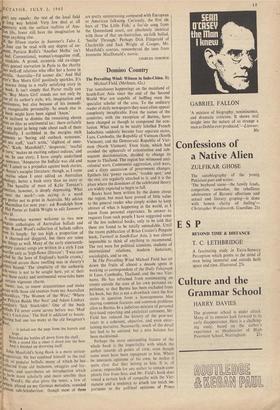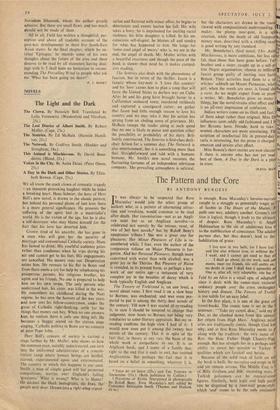Domino Country
The Prevailing Wind: Witness in Indo-China. By Michael Field.'(Methuen, 42s.) THE tumultuous happenings on the mainland of South-East Asia since the end of the Second World War are capable of baffling even the specialist scholar of the area. To the ordinary reader of daily newspapers they must often appear completely inexplicable. Even the names of the countries, with the exception of Burma, have been changed as though to compound the con- fusion. What used to be neatly labelled French Indochina suddenly became four separate states, Laos, Cambodia, the Republic of Vietnam (South Vietnam), and the Democratic Republic of Viet- nam (North Vietnam). Even Siam, which had avoided the upheavals of colonisation and sub- sequent decolonisation, decided to change its name to Thailand. The region has witnessed anti- colonial wars, Communist aggression, civil wars, and a dizzy succession of government changes. Epithets like `power vacuum,' trouble spot,' and the rest, are regularly attached to it, and it is the place where the dominoes of the celebrated theory are widely expected to begin to fall.
Books have been written by the dozen about the region, but most have proved of little value to the general reader who simply wishes to keep abreast of what is happening in the world, as I know from personal experience. In answer , to requests from such people I have suggested some of the less technical books, only to be told that these are found to be totally unreadable. Until the recent publication of Brian Crozier's Penguin book, Turmoil in South-East Asia, it was almost' impossible to think of anything to recommend. The rest were for political scientists, students of international relations, modern historians, sociologists, and so on.
In The Prevailing Wind Michael Field has set down the fruits of almost a decade spent in working as correspondent of the Daily Telegraph. in Laos, Cambodia, Thailand, and the two Viet- nams. He has refrained from commenting on events outside the area of his own personal ex- perience, so that Burma has been excluded from his book, but this is not a drawback since the five states in question form a homogeneous bloc sharing common features and common problems alien to Burma. In a judicious mixture of personal first-hand reporting and analytical comment, Mr. Field has reduced the history of the post-war years to a coherent, objective, and even enter- taining narrative. Necessarily, much of the detail has had to be omitted, but a nice balance has been maintained.
Perhaps the most outstanding feature of the whole book is the impartiality with which the author records all points of view, even though some must have been repugnant to him. Where he interjects opinions of his own, he makes it quite clear that they belong to him. It is, of Course, impossible for any author to remain com- pletely free from bias, and Mr. Field's book does reveal a certain lack of sympathy with the Viet- namese and a tendency to attach too much im- portance to the political opinions of Prince
Norodom Sihanouk, whom the author greatly admires. But these are small flaws, and too much should not be made of them.
All in all, Field has written a thoughtful, per- ceptive and above all readable account of the post-war developments in these five South-East Asian states. In the final chapter, which he en- titled 'Epilogue,' he records some of his own thoughts about the future of the area and these deserve to be read by all statesmen having deal- ings with it. I shall have no hesitation in recom- mending The Prevailing Wind to people who ask me `What has been going on there?'
P. J. HONEY











































 Previous page
Previous page